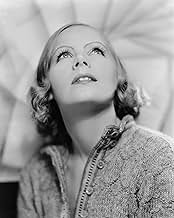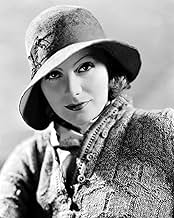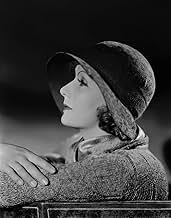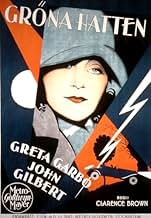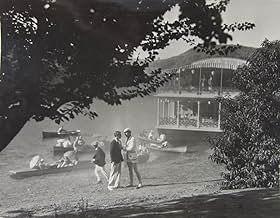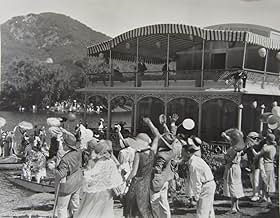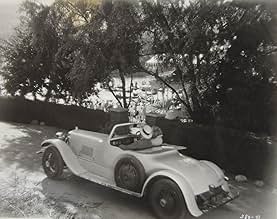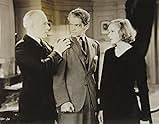NOTE IMDb
7,1/10
1,8 k
MA NOTE
Après un chagrin d'amour, Diana s'abandonne à la mauvaise vie et cherche le bonheur dans les bras d'autres hommes. Finalement, elle en épouse un qui s'avère être un criminel.Après un chagrin d'amour, Diana s'abandonne à la mauvaise vie et cherche le bonheur dans les bras d'autres hommes. Finalement, elle en épouse un qui s'avère être un criminel.Après un chagrin d'amour, Diana s'abandonne à la mauvaise vie et cherche le bonheur dans les bras d'autres hommes. Finalement, elle en épouse un qui s'avère être un criminel.
- Réalisation
- Scénario
- Casting principal
- Nommé pour 1 Oscar
- 2 victoires et 1 nomination au total
Johnny Mack Brown
- David Furness
- (as John Mack Brown)
Gertrude Astor
- Party Guest
- (non crédité)
Agostino Borgato
- French Police Inspector
- (non crédité)
F.F. Guenste
- Servant at Davids Death Investigation
- (non crédité)
Sydney Jarvis
- Gendarme
- (non crédité)
Fred Kelsey
- Detective
- (non crédité)
Anita Louise
- Diana - as a Child
- (non crédité)
Alphonse Martell
- French Hotel Concierge
- (non crédité)
William H. O'Brien
- Man Peering Into Room
- (non crédité)
Frank Finch Smiles
- Butler
- (non crédité)
Avis à la une
Greta garbo's career spanned the 1920s (silents) and 1930s (talkies). This one came about halfway through, just before the switch to talkies. And because it's a silent, you are forced to really pay attention. Featuring garbo and gilbert, the huge stars of the day. Co-stars a couple more big names.. doug fairbanks and lewis stone. Diana and neville want to be married, but his father wants to prevent it from happening. High drama, in spite of the fact that it's been toned way down from the original story. This started life as a novel, then a play, and later this film! According to the trivia section, because the original story had so many taboo elements, it was all changed around to get past the censors. Interesting, since so many of the production code rules didn't really get enforced until the early 1930s. It's a good film, in spite of all the changes. It was even nominated for best writing. And that's an accomplishment, since the story had been so altered. Directed by clarence brown. And pretty amazing picture quality, since this is coming up on 100 years old. Must have been a good restoration. Never miss a greta garbo film!
I'd seen the remake Outcast Lady before I rented the original silent version A Woman of Affairs. In both stories, the plot is heavily censored from the novel, but if you don't know what's been cut it still seems entertaining and complex.
In this cast, Greta Garbo is in love with her childhood friend, John Gilbert, but his father doesn't approve. When he sends his son away for a years-long business trip, Greta retaliates by marrying her brother's best friend, Johnny Mack Brown. On their wedding night, Johnny gets upset and commits suicide, but since Greta refuses to tell anyone why he was so upset, everyone assumes it was her fault. Her brother, Douglas Fairbanks, Jr., in particular, blames her and accuses her of confessing sinful secrets to Johnny that made him rather die than face a life with her. Greta is banished, and Doug Jr. drinks to drown his sorrows. Only one man continually stands up for her, her pal Lewis Stone, who might harbor more than friendship in his heart.
In both versions, the woman's character doesn't really make sense. You can get past her marrying a man she doesn't love because she believes the man she does love has forgotten her, but accepting a banishment and terrible reputation when a simple explanation could have cleared things up doesn't make much sense. And after such a terrible scandal, for which she is blamed, it hardly makes sense to turn into a hussy. Why is that the answer to her problems? The rest of it is a good old-fashioned melodrama, so if you like soapy plots like that, you'll probably like to see one of the versions. Having seen both, I actually prefer the silent movie to the talkie. The story is simple and doesn't need a lot of dialogue, and since it's so over-the-top, it makes sense to have over-the-top acting to go along with it.
In this cast, Greta Garbo is in love with her childhood friend, John Gilbert, but his father doesn't approve. When he sends his son away for a years-long business trip, Greta retaliates by marrying her brother's best friend, Johnny Mack Brown. On their wedding night, Johnny gets upset and commits suicide, but since Greta refuses to tell anyone why he was so upset, everyone assumes it was her fault. Her brother, Douglas Fairbanks, Jr., in particular, blames her and accuses her of confessing sinful secrets to Johnny that made him rather die than face a life with her. Greta is banished, and Doug Jr. drinks to drown his sorrows. Only one man continually stands up for her, her pal Lewis Stone, who might harbor more than friendship in his heart.
In both versions, the woman's character doesn't really make sense. You can get past her marrying a man she doesn't love because she believes the man she does love has forgotten her, but accepting a banishment and terrible reputation when a simple explanation could have cleared things up doesn't make much sense. And after such a terrible scandal, for which she is blamed, it hardly makes sense to turn into a hussy. Why is that the answer to her problems? The rest of it is a good old-fashioned melodrama, so if you like soapy plots like that, you'll probably like to see one of the versions. Having seen both, I actually prefer the silent movie to the talkie. The story is simple and doesn't need a lot of dialogue, and since it's so over-the-top, it makes sense to have over-the-top acting to go along with it.
This is a beautifully crafted melodrama, well acted and with high MGM production values, but with moral values that nowadays may well be seen as belonging to another planet. Nevertheless once the historical perspective is in place this is still a simple timeless classic, one I've now seen a dozen times over the years.
Very honourable woman falls in love with equally honourable man, much to his even more honourable father's disfavour. You might notice that understanding "Honor" is the key to understanding this film! Garbo and Gilbert were perfect for the roles (making this a lovely bookend for Flesh And The Devil) and both never looked more gleaming beautiful, although Garbo had a few odd costumes along the way. They had a couple of languid clinches, but this time the plot got in the way of these scenes becoming "hot". Lewis Stone had already dropped into his avuncular stereotype here, his was a marvellously hammy but key performance. Everyone undulates their way to a fitting climax and conclusion (although didn't Neville come back into the room to Constance rather fast after Diana told him ---- ?)
All in all one of my favourite silent melodramas, strangely neglected nowadays - or is there no honour left?
Very honourable woman falls in love with equally honourable man, much to his even more honourable father's disfavour. You might notice that understanding "Honor" is the key to understanding this film! Garbo and Gilbert were perfect for the roles (making this a lovely bookend for Flesh And The Devil) and both never looked more gleaming beautiful, although Garbo had a few odd costumes along the way. They had a couple of languid clinches, but this time the plot got in the way of these scenes becoming "hot". Lewis Stone had already dropped into his avuncular stereotype here, his was a marvellously hammy but key performance. Everyone undulates their way to a fitting climax and conclusion (although didn't Neville come back into the room to Constance rather fast after Diana told him ---- ?)
All in all one of my favourite silent melodramas, strangely neglected nowadays - or is there no honour left?
Greta Garbo was the antithesis of the old fashioned, expressive silent movie actors of yesteryear. Instead of wildly moving her arms and gesturing her emotions with her total body, the Swedish actress expressed her characters' emotions by way of little hints of facial movements. A perfect example of her subtle acting expressions is seen in her third movie with actor and lover John Gilbert in December 1928's "A Woman of Affairs."
Movie critic David Denby described her acting style in the way she lowered her "head to look calculating or flutters her lips. Her face darkens with a slight tightening around the eyes and mouth; she registers a passing idea with a contraction of her brows or a drooping of her lids. Worlds turned on her movement."
"A Woman of Affairs" was another huge money-maker for MGM. The movie proved that Garbo was becoming a printing press of dollar bills for the studio. This was her fifth Hollywood film, and the adoring public continued to flock to movie houses nationwide to witness those slight yet profound expressions. As a contemporary reviewer penned in 1929, "She has glamour and fascination for both sexes which have never been equaled on the screen." Based on a 1925 play adapted from the 1924 best-selling but controversial novel The Green Hat, by Michael Arlen, "A Woman of Affairs" forced MGM to rework some the important details mentioned in both the novel and the play that included descriptions of syphilis, miscarriages and heroin use. The Will Hays Production Code frowned on those topics. The story, set in England, focuses on three childhood friends, Neville (John Gilbert), who falls for friend Diana (Garbo). An assignment to Egypt causes Neville to miss his opportunity to marry Diana, who ends up crossing the threshold with her other childhood friend, David (Johnny Mack Brown). During their honeymoon, David commits suicide for embezzlement. Setting off a soap opera-like drama is Diana's eye-popping discovery that Neville has returned to England several years later with a new-found love in Constance (Dorothy Jeffry).
Critics point out the movie's highlight occurs when Garbo is in the hospital nine months after she spent an evening over Neville's house. It's hinted she's had a miscarriage, which explains her passion to cradle a bundle of flowers. The sequence displays every emotion an actress can possibly show: from crying, to loving, to questioning, to a sense of loss and hope. Garbo informs the viewers all this simply by her facial expressions. Because of such a highly emotional sequence in the hospital, Garbo's clout with the studio was so valuable that MGM granted her the unusual request that visitors, including studio executives, be restricted from the set. The actress even asked black screens be built surrounding the area she was filming so extras and even technicians couldn't view her acting. Garbo defended her closed sets by explaining "If I am by myself, my face will do things I cannot do with it otherwise."
No one could argue about the results Garbo gave on the big screen. And the beancounters in the studio's accounting room stood by the actress's on-set demands after their offices were flooded with the receipts from the tremendous amount of tickets she sold under the MGM logo.
Movie critic David Denby described her acting style in the way she lowered her "head to look calculating or flutters her lips. Her face darkens with a slight tightening around the eyes and mouth; she registers a passing idea with a contraction of her brows or a drooping of her lids. Worlds turned on her movement."
"A Woman of Affairs" was another huge money-maker for MGM. The movie proved that Garbo was becoming a printing press of dollar bills for the studio. This was her fifth Hollywood film, and the adoring public continued to flock to movie houses nationwide to witness those slight yet profound expressions. As a contemporary reviewer penned in 1929, "She has glamour and fascination for both sexes which have never been equaled on the screen." Based on a 1925 play adapted from the 1924 best-selling but controversial novel The Green Hat, by Michael Arlen, "A Woman of Affairs" forced MGM to rework some the important details mentioned in both the novel and the play that included descriptions of syphilis, miscarriages and heroin use. The Will Hays Production Code frowned on those topics. The story, set in England, focuses on three childhood friends, Neville (John Gilbert), who falls for friend Diana (Garbo). An assignment to Egypt causes Neville to miss his opportunity to marry Diana, who ends up crossing the threshold with her other childhood friend, David (Johnny Mack Brown). During their honeymoon, David commits suicide for embezzlement. Setting off a soap opera-like drama is Diana's eye-popping discovery that Neville has returned to England several years later with a new-found love in Constance (Dorothy Jeffry).
Critics point out the movie's highlight occurs when Garbo is in the hospital nine months after she spent an evening over Neville's house. It's hinted she's had a miscarriage, which explains her passion to cradle a bundle of flowers. The sequence displays every emotion an actress can possibly show: from crying, to loving, to questioning, to a sense of loss and hope. Garbo informs the viewers all this simply by her facial expressions. Because of such a highly emotional sequence in the hospital, Garbo's clout with the studio was so valuable that MGM granted her the unusual request that visitors, including studio executives, be restricted from the set. The actress even asked black screens be built surrounding the area she was filming so extras and even technicians couldn't view her acting. Garbo defended her closed sets by explaining "If I am by myself, my face will do things I cannot do with it otherwise."
No one could argue about the results Garbo gave on the big screen. And the beancounters in the studio's accounting room stood by the actress's on-set demands after their offices were flooded with the receipts from the tremendous amount of tickets she sold under the MGM logo.
This film is a great Garbo vehicle, and has such a perfect example of her mystique. She somehow manages to be a woman who enjoys sexual pleasure and the company of men, but at the same time, is saintly, with a love that is pure for only one man, and sacrifices herself in more than one way ... and she is transcendent on both sides of this coin. The film is packed with moments where a range of her wonderful expressions are on display, some vivid, some subtle. If you're a Garbo fan or want to become one, this would certainly not be a bad place to start.
Unfortunately, the film suffers a bit from a heavy dose of melodrama, most of which seems pretty contrived. The plot often doesn't make a lot of sense, in part because the original story was watered down pretty significantly for the censors. An example of this is the questioning of Garbo after her husband has committed suicide. It's obvious why this happened; he was about to be arrested for embezzlement and the police saw him jump, so the viewer (ok me anyway) is watching the aftermath thinking huh? In the original, however, it was because he has syphilis, something that was obviously a personal secret, and hence the questioning (and also later shunning) of Garbo. There are other examples that took too much of the edge off the story and made it less sensical.
Garbo dominates the film, but it's a fine cast behind her. John Gilbert is given less to do here which is too bad, but the chemistry the pair had is quite evident in a couple of open lip kisses. Dorothy Sebastian is radiant as a virtuous woman, and Douglas Fairbanks, Jr. is suitably desperate as an alcoholic.
The film touches on marrying someone who is decent and loving them for that quality, but being passionate and truly in love with someone else, which is a timeless theme. The scene where Garbo is waiting in her honeymoon bed and gets a tepid kiss on the forehead, then in frustration resorts to turning on and off the overhead light after being left alone says it all. At one point her real love, played, by Gilbert, asks "Why did I ever let you go?" to which she responds "Yes, why?", and I don't think the film gives a good answer to this question, especially as it plays out. The pace as it does so is a little on the slow side too, and the dramatic ending is over-the-top. It's a near miss for getting a higher rating, but it's certainly watchable for Garbo.
Unfortunately, the film suffers a bit from a heavy dose of melodrama, most of which seems pretty contrived. The plot often doesn't make a lot of sense, in part because the original story was watered down pretty significantly for the censors. An example of this is the questioning of Garbo after her husband has committed suicide. It's obvious why this happened; he was about to be arrested for embezzlement and the police saw him jump, so the viewer (ok me anyway) is watching the aftermath thinking huh? In the original, however, it was because he has syphilis, something that was obviously a personal secret, and hence the questioning (and also later shunning) of Garbo. There are other examples that took too much of the edge off the story and made it less sensical.
Garbo dominates the film, but it's a fine cast behind her. John Gilbert is given less to do here which is too bad, but the chemistry the pair had is quite evident in a couple of open lip kisses. Dorothy Sebastian is radiant as a virtuous woman, and Douglas Fairbanks, Jr. is suitably desperate as an alcoholic.
The film touches on marrying someone who is decent and loving them for that quality, but being passionate and truly in love with someone else, which is a timeless theme. The scene where Garbo is waiting in her honeymoon bed and gets a tepid kiss on the forehead, then in frustration resorts to turning on and off the overhead light after being left alone says it all. At one point her real love, played, by Gilbert, asks "Why did I ever let you go?" to which she responds "Yes, why?", and I don't think the film gives a good answer to this question, especially as it plays out. The pace as it does so is a little on the slow side too, and the dramatic ending is over-the-top. It's a near miss for getting a higher rating, but it's certainly watchable for Garbo.
Le saviez-vous
- AnecdotesMichael Arlen's 1924 novel was turned into a play of the same title, "The Green Hat." It opened on Broadway at the Broadhurst Theatre, 235 W. 44th St., on September 25, 1925 and ran for 231 performances.
- GaffesWhen Diana (as a child) rides her bike into the tree, the cut from the little girl (with short legs and her foot off the pedal) to the stunt-double (with long legs and her foot on the pedal) is obvious.
- Citations
Title Card: The widow of David Furness faced a questioning world. Why should a man - happy as David was - take his own life - - ?
- Versions alternativesMetro-Goldwyn-Mayer also released this picture as a totally silent movie.
- ConnexionsFeatured in Strictly Dishonorable (1951)
Meilleurs choix
Connectez-vous pour évaluer et suivre la liste de favoris afin de recevoir des recommandations personnalisées
- How long is A Woman of Affairs?Alimenté par Alexa
Détails
Box-office
- Budget
- 383 000 $US (estimé)
- Durée1 heure 38 minutes
- Couleur
- Mixage
- Rapport de forme
- 1.33 : 1
Contribuer à cette page
Suggérer une modification ou ajouter du contenu manquant


